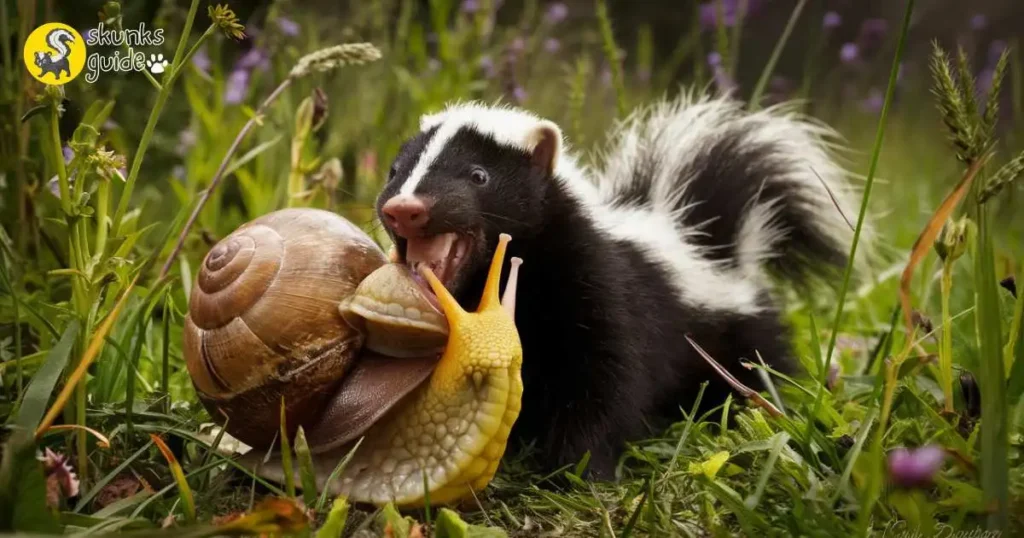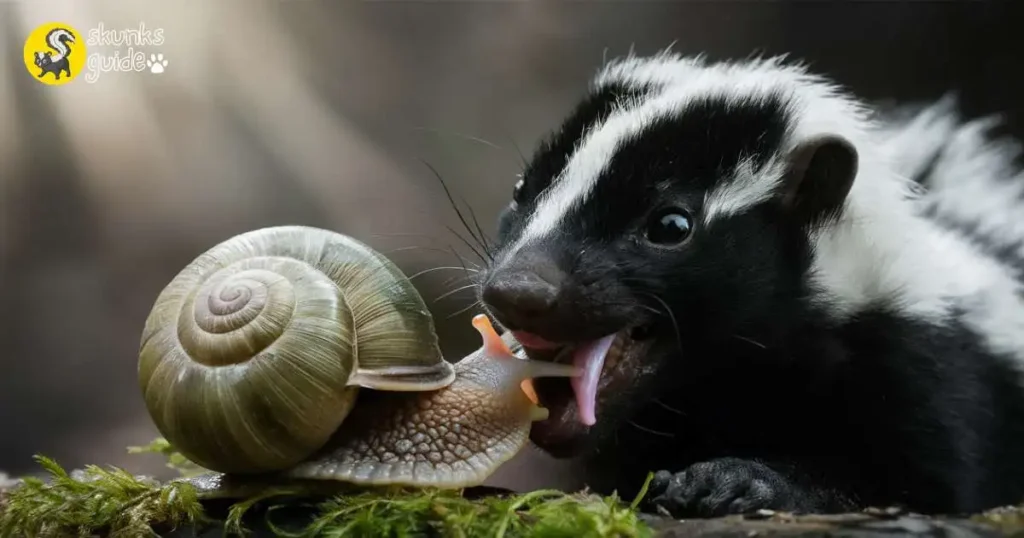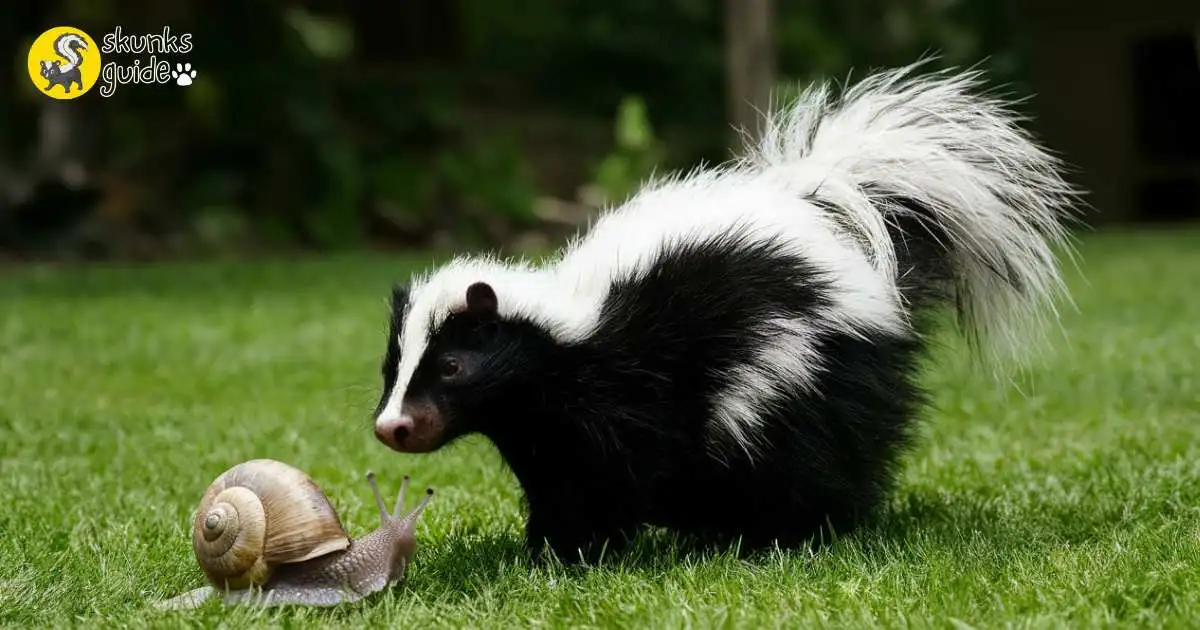Do Skunks Eat Snails? Let’s find out! – Untamed
Last updated on August 11th, 2024 at 07:28 am
Yes, skunks do eat snails! As someone who has studied skunks both as a pet owner and a wildlife enthusiast, I’ve learned that snails are part of their diverse diet. These black and white animals are known for their stinky spray, but their eating habits are just as interesting. Skunks eat many things, including insects, larvae, grubs, and snails, which helps them live in many places. Want to learn how skunks’ snail-eating helps gardens and fields? Keep reading!
Snails As A Food Source
Do skunks eat snails? This question might tickle the curiosity of many. Skunks are known for their varied diet and snails can be a part of it. As omnivores, skunks enjoy a mix of plants and animals. Snails, with their soft bodies protected by a hard shell, offer a unique food option. Rich in protein and easy to catch, snails can be a tasty treat for skunks. Let’s delve into what makes these slow-moving creatures a potential snack for our striped friends.

Preference For Insects
Skunks have a strong preference for insects, which form a significant part of their diet. Their choice of insects includes:
- Beetles: They are easy to find and rich in nutrients.
- Grubs: Found underground, grubs make a juicy snack.
- Worms: These are a staple, especially after rain.
Why do skunks favor insects? It’s simple:
- Insects are abundant.
- They are high in protein.
- Catching them is less work.
Despite this insect preference, snails occasionally catch a skunk’s eye. Snails are slower and less challenging to hunt. They provide a good protein boost, especially in regions where insects are scarce. Skunks use their sharp claws to break open the snail shells. They then feast on the soft insides.
Occasional Consumption
While insects are the main attraction, skunks will eat snails occasionally. This consumption is more common when:
- Other food sources are not available.
- They need a quick protein fix.
- Snails are in abundance during damp seasons.
Snails are not a skunk’s first choice, but they are a welcome alternative. Skunks adapt their diet to what’s available, and snails can be plentiful. They don’t require much energy to capture and can be a nutritious option. Skunks balance their diet based on availability and ease, making snails an opportunistic choice.
Benefits Of Eating Snails

Skunks are known for their distinctive black and white fur and their ability to spray a strong odor. But these nocturnal creatures have diverse diets. They often eat snails as part of their diet. Snails offer skunks a tasty snack that’s also full of benefits. Let’s explore why snails are a healthy choice for these animals.
Rich In Nutrients
Snails are a power-packed meal for skunks, offering a range of essential nutrients. These include:
- Proteins: Crucial for muscle and tissue repair.
- Iron: Vital for healthy blood and energy levels.
- Calcium: Important for strong bones and teeth.
- Vitamins: Snails have vitamins A and E, supporting vision and skin health.
A closer look at the nutritional content of snails reveals their value in a skunk’s diet. Here’s a table summarizing the key nutrients per 100 grams of snail meat:
| Nutrient | Amount |
|---|---|
| Protein | 16 grams |
| Iron | 3.5 mg |
| Calcium | 170 mg |
| Vitamin A | 100 IU |
| Vitamin E | 5 mg |
These nutrients make snails a healthy snack. They help skunks stay active and healthy.
Control Of Snail Population
A skunk’s appetite for snails isn’t just good for the skunk—it helps the ecosystem too. By eating snails, skunks play a role in controlling the snail population. This can be important because:
- Prevents Overpopulation: Too many snails can lead to garden damage.
- Maintains Balance: Keeping snail numbers in check helps plant life.
Here’s how the skunk’s diet impacts the environment positively:
- Skunks search for snails, which keeps snail numbers down.
- This prevents snails from eating too many plants and crops.
- Healthy plant life supports other wildlife and maintains biodiversity.
In essence, skunks help gardeners and farmers by naturally reducing the need for pesticides. This makes gardens and farms healthier places for all creatures.
Risks And Limitations
Skunks are curious creatures with diverse diets, but have you ever wondered if they eat snails? While snails can be a part of their menu, it’s not without risks and limitations. Skunks must navigate certain dangers when feasting on these shelled creatures, and their diet is not solely dependent on such slow-moving mollusks.
Snail Venom
Skunks are known to eat a variety of animals, including snails. However, not all snails are safe to consume. Some snails produce venom as a defense mechanism. This venom can be harmful to predators, including skunks. The risks associated with eating venomous snails include:
- Health Issues: Venom can cause sickness in skunks, affecting their ability to forage.
- Reduced Prey: Some snail species may become scarce due to overpredation or environmental changes.
- Competition: Skunks may face competition from other predators also seeking snails.
Moreover, skunks need to be cautious of the snail’s habitat. Snails that dwell in contaminated areas might accumulate toxins in their bodies, posing additional risks to skunks. Here’s a table summarizing potential threats from snail consumption:
| Risk Factor | Details |
|---|---|
| Venom | Snails with defensive venom can poison skunks. |
| Toxins | Snails from polluted environments may contain harmful substances. |
| Scarcity | Overconsumption can lead to a decrease in snail populations. |
Other Food Sources
Skunks have a varied diet that includes more than just snails. They are omnivores and enjoy a wide range of foods. Some of their favorite meals consist of:
- Insects: Beetles, bees, and larvae offer protein.
- Fruits: Berries and fallen fruits provide natural sugars.
- Small Rodents: Mice and voles are nutritious prey.
- Eggs: Eggs from birds and reptiles are easy targets.
These alternative food sources are essential for skunks, especially when snails are not available or are too risky to eat. The availability of different foods depends on the season and habitat. Skunks adapt their diet to what is accessible, keeping their meals diverse and balanced. The table below showcases the variety in a skunk’s diet.
| Food Type | Benefits |
|---|---|
| Insects | Rich in protein, available in most habitats. |
| Fruits | Provide vitamins and are easily found in the wild. |
| Small Rodents | High in nutrients, help maintain the rodent population. |
| Eggs | Good source of protein, often found in nests on the ground. |
Frequently Asked Questions
Are Skunks Good To Have In Your Yard?
Skunks can benefit your yard by eating pests and insects. Yet, their spray poses a nuisance, and they may dig up lawns.
What Pests Do Skunks Eat?
Skunks primarily eat insects, grubs, small rodents, frogs, lizards, birds, and eggs. They also consume various types of worms and larvae.
What Is The Only Animal That Will Eat A Skunk?
Great horned owls are the primary predators known to eat skunks. Their limited sense of smell makes them largely indifferent to the skunk’s defensive spray.
Conclusion
To sum up, skunks do indeed include snails in their varied diet. This small detail about skunk feeding habits adds to our understanding of their ecological role. Remember, the presence of these creatures benefits gardens by controlling pests. Keep sharing nature’s fascinating intricacies with fellow wildlife enthusiasts!

